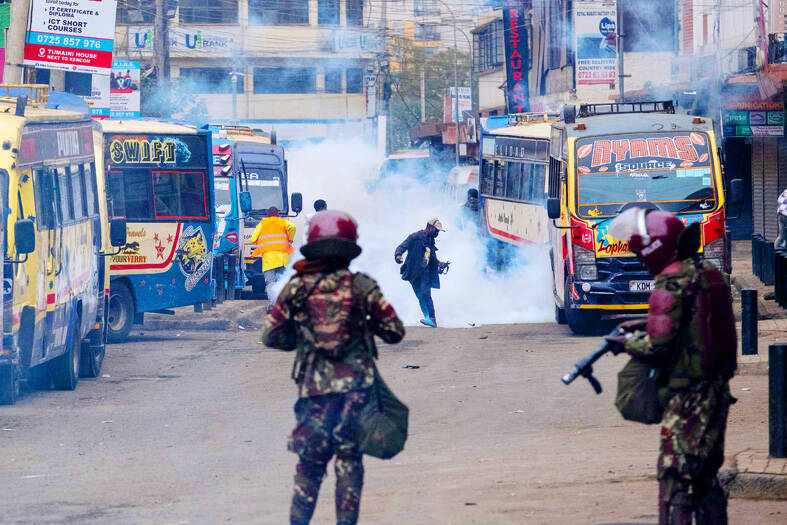Kenyan police on Thursday fired tear gas at protesters in Nairobi calling for the president’s resignation as a new Cabinet was being sworn in, the latest in the deadly turmoil that has gripped the East African nation over the summer.
Protests in Kenya first erupted in June, with initial calls for legislators to vote against a controversial finance bill that proposed increased taxes amid the high cost of living. Antigovernment protesters stormed the parliament on June 25, drawing police fire after legislators voted to pass the bill.
More than 50 people have died since the demonstrations began, the Kenya National Commission on Human Rights said.

Photo: AFP
On Thursday, businesses in the city were closed and public transport vehicles remained out of the central business district. Police also set up roadblocks on major roads to Nairobi. President William Ruto’s office, where the new ministers were sworn in, also remained cordoned off.
Police said that 174 protesters were arrested on Thursday and protest organizers did not notify them of their intention to demonstrate.
“We ensured adequate deployment of security personnel and cautioned members of the public to avoid crowded areas that were likely to turn riotous,” Acting Inspector General of Police Gilbert Masengeli said.
The protests were organized by activists upset with Ruto even after he dismissed almost all of his ministers and added opposition members to what he called a “broad-based” government.
However, other major urban centers, including the lakeside city of Kisumu — an opposition stronghold that has previously witnessed protests — remained calm with some residents telling reporters they were not protesting because the opposition members had been incorporated into the new Cabinet.
Civil society groups, along with the Law Society of Kenya, called in a joint statement for the upholding of human rights during demonstrations and urged police to refrain from deploying non-uniformed officers and using unmarked vehicles.
“We reiterate constitutional protection of all persons to peaceably protest, picket and to present petitions to the authorities,” the statement said.
Nicole Awuori said she was demanding justice for those killed during previous protests. “I am protesting for the people who have missed out on so many opportunities because of broken systems,” she said.
Another protester, Emmanuel, who used only one name because he feared for his safety, said he would keep rallying until the president resigns.
“We are here to force him to leave office and go home,” Emmanuel said.
Police surrounded the home of Jimi Wanjigi, a prominent businessman with political aspirations who has also been calling for Ruto’s resignation.
Police chief Masengeli said tear-gas cannisters and phones were recovered from a vehicle at Wanjigi’s home.
Ruto on Wednesday condemned the protests and urged Kenyans to stay away from them, saying those who want change can vote him out of office in the 2027 elections.
Activists who had planned an “8/8 Liberation March” on Thursday said the day before that demonstrators would treat nonuniformed police officers as criminals.
“We shall march for our rights,” activist Kasmuel Mcoure said.
After the bill was passed in June, Ruto declined to sign it into law and sent it back to parliament, saying he had “heard Kenyans who wanted nothing to do with the bill,” but warned there would be revenue and expenditure consequences.
Protests continued with calls for Ruto’s resignation over bad governance, corruption, the incompetence of his Cabinet and lack of accountability. Ruto then dismissed all but one Cabinet minister, but the protests continued.

THE TRAGEDY OF PUNCH: Footage of the seven-month-old Japanese macaque has gone viral online after he was rejected by his mother and formed a bond with a soft toy A baby monkey in Japan has captured hearts around the world after videos of him being bullied by other monkeys and rejected by his mother went viral last week. Punch, a Japanese macaque, was born in July last year at Ichikawa City Zoo. He has drawn international attention after zookeepers gave him a stuffed orangutan toy after he was abandoned by his mother. Without maternal guidance to help him integrate, Punch has turned to the toy for comfort. He has been filmed multiple times being dragged and chased by older Japanese macaques inside the enclosure. Early clips showed him wandering alone with

South Korea would soon no longer be one of the few countries where Google Maps does not work properly, after its security-conscious government reversed a two-decade stance to approve the export of high-precision map data to overseas servers. The approval was made “on the condition that strict security requirements are met,” the South Korean Ministry of Land, Infrastructure and Transport said. Those conditions include blurring military and other sensitive security-related facilities, as well as restricting longitude and latitude coordinates for South Korean territory on products such as Google Maps and Google Earth, it said. The decision is expected to hurt Naver and Kakao

Australian Prime Minister Anthony Albanese yesterday said he did not take his security for granted, after he was evacuated from his residence for several hours following a bomb threat sent to a Chinese dance group. Albanese was evacuated from his Canberra residence late on Tuesday following the threat, and returned a few hours later after nothing suspicious was found. The bomb scare was among several e-mails threatening Albanese sent to a representative of Shen Yun, a classical Chinese dance troupe banned in China that is due to perform in Australia this month, a spokesperson for the group said in a statement. The e-mail

‘OCCUPATION’: Hong Kong said it had lodged ‘stern protests’ with Panama’s consulate, and would ‘staunchly support’ the rights and interests of Hong Kong companies Panamanian President Jose Raul Mulino on Monday ordered the temporary occupation of two ports run by a unit of CK Hutchison Holdings Ltd following the Supreme Court’s ruling against the firm’s concession, escalating a dispute that has become a proxy battle between the US and China in Latin America. Mulino said in a speech that the administration and operation of the two ports on the strategic Panama Canal is to revert to the country’s National Maritime Authority to ensure their uninterrupted, safe and efficient operation. The occupation covers movable equipment at the ports and does not mean a definitive loss of